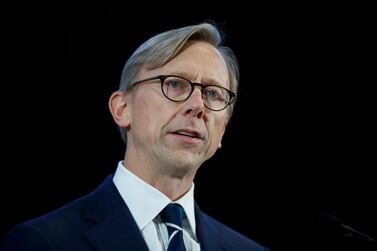Brian Hook, the US special representative for Iran who led President Donald Trump's tough stance on Tehran, has resigned from his post, Secretary of State Mike Pompeo announced on Thursday.
Mr Pompeo praised Mr Hook’s work on Iran in the past year and a half.
“He successfully negotiated with the Iranians the release of Michael White and Xiyue Wang from prison,” he said.
Mr Pompeo said Mr Hook “set into motion a range of new strategies that advanced the national security interests of the United States and our allies”.
He said the US special representative for Venezuela, Elliott Abrams, would take up Mr Hook's position.
Mr Abrams is known for his hawkish foreign policy views developed across several positions he held in different US administrations.
During the presidencies of Ronald Reagan and George W Bush, he oversaw policy on Latin America, Israel, Lebanon and Iran.
Mr Abrams was convicted in 1991 of misleading Congress during the Iran-contra affair but was pardoned by former president George H W Bush.
He is a fierce opponent of the Iran nuclear deal signed by the previous administration of Barack Obama, writing in 2016 that the deal had no benefits.
"It's obvious that the nuclear deal has made everything worse, by enriching Iran greatly without moderating its conduct at all, by getting us less rather than more information about the Iranian nuclear programme, and perhaps worst of all, by legitimising that programme," Mr Abrams wrote in The Jerusalem Post.

He also supports Venezuelan opposition leader Juan Guaido's claim to leadership over that of President Nicolas Maduro.
In an article from September 2017 for the Council on Foreign Relations, Mr Abrams wrote of North Korea: “Of course we want a different regime there. The same goes for other countries ruled by horrendous tyrannies, such as Iran and Venezuela.”
That year, former US secretary of state Rex Tillerson tried to recruit Mr Abrams for a Middle East position at the department but he was blocked by the White House.
Mr Abrams is a former “never-Trumper” and heavily criticised Mr Trump during the 2016 campaign.
In 2005, after the assassination of former Lebanese prime minister Rafik Hariri, Mr Abrams played a leading role in gathering support in the administration of George W Bush and at the UN for a special tribunal to look into the killing.
Renewing the UN arms embargo on Iran will be his most immediate challenge as the US prepares to present a resolution to the Security Council next week.
Russia and China, which have power of veto in the council, have objected to extending the embargo set to expire on October 18.
Mr Pompeo said on Wednesday that the US was determined to not let the embargo expire and left options open on imposing snapback sanctions on Iran if the extension were not achieved.
But activating those sanctions would require the Trump administration to return to the Iran nuclear deal from which it withdrew in 2018.
On Wednesday, at his last public event, Mr Hook said he expected the nuclear deal between Iran and world powers to be dismantled as its clauses continued to expire.
“This deal is going to … keep expiring until there's no deal left," he told the Aspen Security Forum.

The nuclear deal, known as the Joint Comprehensive Plan of Action, placed limits on Iranian nuclear work in exchange for sanctions relief.
Mr Hook also urged renewal of the UN arms embargo and did not rule out returning sanctions.
“We haven’t had a vote yet," he said. " I don’t give up on diplomacy until I see the vote and hands up in New York."








